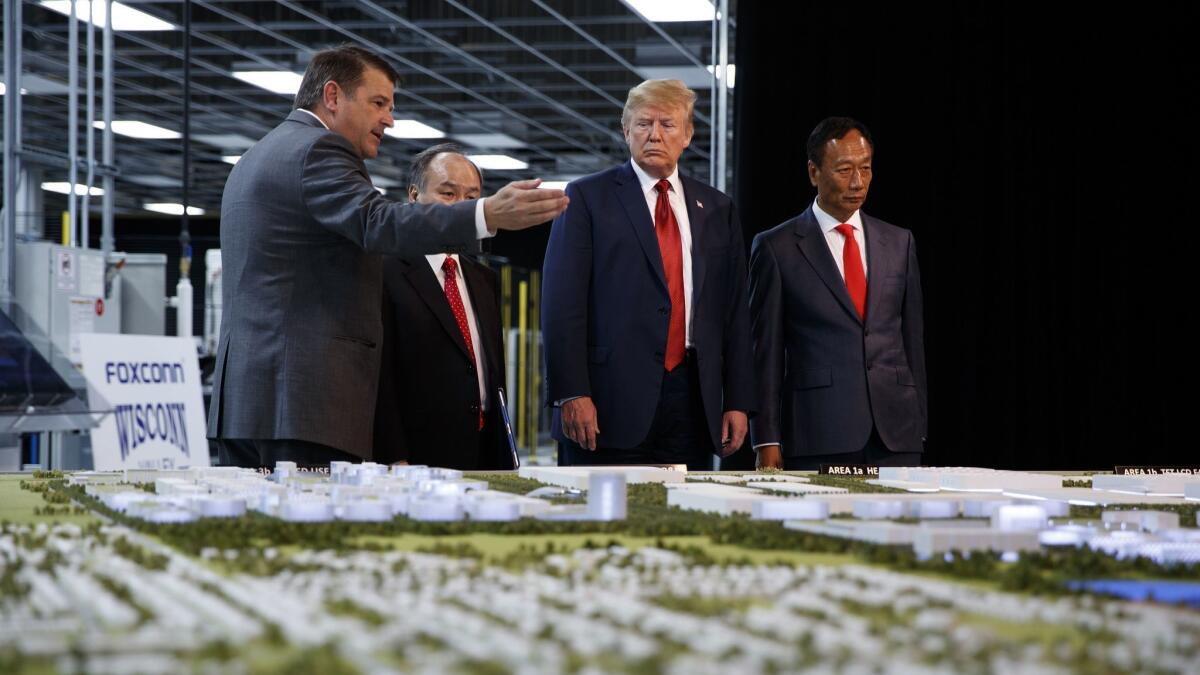Amazon’s New York retreat heralds a new era of corporate welfare fights

- Share via
Just as New Yorkers were absorbing Amazon.com Inc.’s decision to abandon a new office hub after tangling over $3 billion in tax breaks, General Electric Co. was beating a retreat in Boston, canceling plans to build an office tower and promising to return $87 million in government incentives. In Wisconsin, Taiwanese manufacturer Foxconn was backing away from promises it made in exchange for billions in incentives.
Stoked by Amazon’s decision to turn its search for a new office hub into a nationwide reality show, a long-simmering backlash to corporate subsidies is coming to a boil. State legislators in Connecticut, Florida, Illinois and New York are targeting subsidies to individual companies. At the federal level, Sen. Bernie Sanders last year introduced a bill that would tax Amazon, Walmart Inc. and other big employers whose workers collect public assistance.
Good government advocates have long complained that giving tax breaks and other incentives to lure corporations to states and municipalities was a wasteful practice. (Just how wasteful was hard to calculate, but a New York Times investigation in 2012 reported that states, cities, and counties are giving up more than $80 billion a year.)
Despite the costs, the political logic behind such deals was simple. Though companies might move to get closer to talented workers or important customers, incentives allow government officials to claim credit for attracting jobs, according to Nate Jensen, a professor at University of Texas-Austin. Lawmakers in locations with little chance of landing a corporate target have a more perverse incentive to make rich offers.
For the most part, deals were done quietly, keeping opponents in the dark. Amazon’s pageant changed that, as did the election of Donald Trump, who turned the recruitment of industrial companies such as Foxconn into key examples of his pro-manufacturing policies.
The attention may have helped corporate locators win richer incentives, but it meant more people were watching to make sure the companies held up their ends of the deal. That hasn’t always been the case.
Foxconn, which won a $4.5-billion incentive package from the state of Wisconsin, indicated last month it was reconsidering whether it is economically feasible to develop liquid-crystal displays in the state, as it promised. The state economic development agency said the company deserves “flexibility” after it changed the fundamental terms of its contract and missed its first-year hiring target.
In Buffalo, N.Y., where Elon Musk once promised to build the largest solar panel factory in the Western Hemisphere, state dealmakers acceded to a series of amendments lowering the number of factory jobs Tesla needed to create under its $750-million incentive contract, with no penalty to the company.
Mary Donegan, an urban and community studies professor at the University of Connecticut, said the local resistance to Amazon’s headquarters search gives other communities a blueprint for fighting big tax break deals, and may convince states to stay away from high-profile megadeals.
Seen another way, Amazon just proves that the economic development game is gaining steam. The company received 238 bids from state and local agencies. It’s unlikely that another company will publicize its hunt for subsidies like Amazon did, but absent a federal ban on deals there’s no reason to expect that the whole thing will go away.
Clark and Mosendz write for Bloomberg.
More to Read
Inside the business of entertainment
The Wide Shot brings you news, analysis and insights on everything from streaming wars to production — and what it all means for the future.
You may occasionally receive promotional content from the Los Angeles Times.










